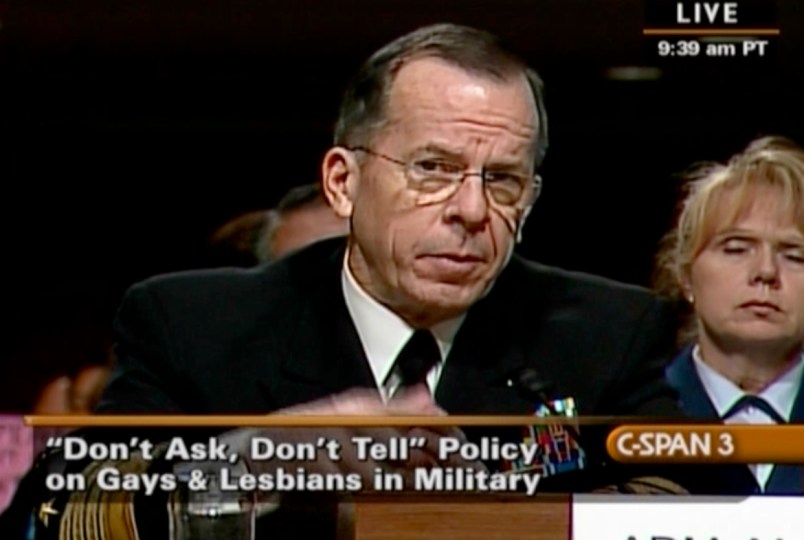When Adm. Michael Mullen, the chairman of the Joint Chiefs of Staff, came out personally against Don’t Ask Don’t Tell this month, even gay rights groups upset that the policy wasn’t being immediately terminated acknowledged that Mullen’s testimony had important symbolic significance.
But in the two weeks since Mullen spoke, a series of developments suggests that Mullen’s public pronouncement was perhaps more than symbolic. It may have marked a tipping point where the elimination of DADT came to be seen as inevitable, a perception which may hasten the change.
The admiral’s support for a repeal — even though he took great pains that it was his own personal opinion and not that of the Joint Chiefs — has changed the legal game, contend two lawyers who worked in the Reagan and George H.W. Bush administrations.
“Congress can no longer mandate discrimination in the armed forces on the basis of sexual orientation,” David B. Rivkin Jr. and Lee A. Casey wrote in a Washington Post op-ed. They added that discriminatory rules are legal only if they make the military more effective.
“The fact that the military’s senior leadership (both in and out of uniform) sees no significant threat to unit cohesion and combat effectiveness from permitting openly gay men and women to serve will make it all but impossible for Congress to articulate a rational basis for excluding them,” they wrote.
Mullen’s testimony, alongside that of Defense Secretary Robert Gates, was unequivocal.
“No matter how I look at this issue, I cannot escape being troubled by the fact that we have in place a policy which forces young men and women to lie about who they are in order to defend their fellow citizens,” Mullen said. “For me, personally, it comes down to integrity, theirs as individuals and ours as an institution.”
He later tweeted, “Stand by what I said: Allowing homosexuals to serve openly is the right thing to do. Comes down to integrity.”
Gay rights groups applauded Mullen and Gates. The Servicemembers Legal Defense Network, which gives legal advice to troops affected by DADT, said they “strongly applaud Chairman Mullen, who unambiguously personally supported gays and lesbians serving openly. The top military brass of the United States just laid out a roadmap for full repeal.”
But his testimony also touched those who have not been fighting for DADT’s repeal.
One of the architects of the policy, Gen. Colin Powell, came out the day after the hearings to “fully support the new approach presented” by Mullen and Gates. Although Powell has in the past called for a review of the policy, this was the first time he expressed support for its repeal.
One gay National Guardsman and prominent DADT opponent, Lt. Dan Choi, was invited back to his unit’s weekend drills shortly after Mullen spoke at the hearing. Choi is in the process of being discharged after coming out on Rachel Maddow, and since his discharge recommendation last summer he had not been participating in his unit’s drills.
One conservative Republican, Sen. Orrin Hatch (R-UT), told MSNBC the day after the hearing that he’s open to seeing the policy repealed. (A day later he backtracked, accusing “liberal groups” of mischaracterizing his comments.)
Most telling is the number of lawmakers, Republicans especially, who have said they will use a review of the policy, due at the end of the year, to define their own stance.
On the Senate Armed Forces Committee, for example, Sens. Susan Collins, Lindsey Graham and George LeMieux have all said they are open to repealing DADT if the military study concludes they should.
Sen. John McCain, the ranking member of the committee, also says he will define his stance by the results of the review. It’s a bit of a backtrack from previous statements, in which he said he’d only support a repeal if military leadership does too. McCain contends that because Mullen spoke on his own personal behalf, it’s not enough for McCain to rescind his support of DADT.
But it seems unlikely that Mullen and Gates would have put themselves on the line for a repeal if they expected the review to show that DADT should remain.









